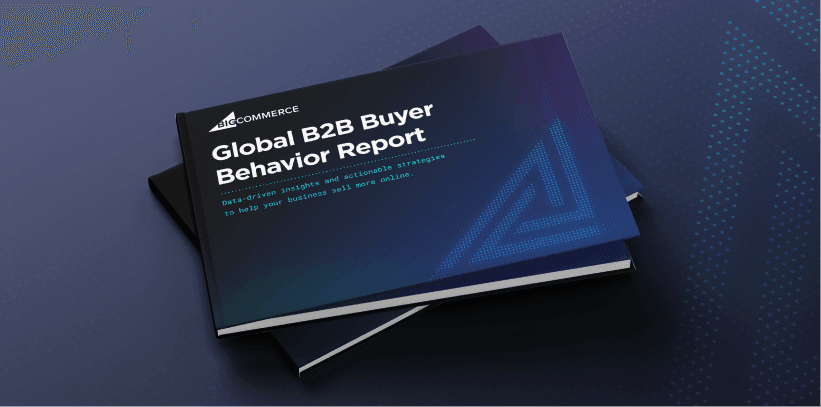by Nicolette V. Beard
10/10/2024
Business school faculty will look back at the era of Open AI and conclude that, quite simply, artificial intelligence (AI) revolutionised digital commerce.
Jake Cook, CEO of Tadpull and a Harvard professor, calls AI a “platform shift” similar to broadband, mobile, or even the internet in a recent B2B Bites podcast episode.
Artificial Intelligence in ecommerce involves various technologies like data mining, natural language processing (NLP), machine learning and deep learning, all working together to transform how online businesses operate.
AI tools are specifically trained using large language models (LLM). These models are limited only by a human’s ability to prompt them to answer a question or solve a problem. Unlike humans, AI can find patterns in your B2B data and make sense of them in seconds, but it costs us in the short term.
Data centres that run LLMs consume a lot of water and a tonne of kilowatts to keep servers cooled and running, fueling an energy surge. As growth continues to soar, environmental demands will rise proportionately.
In the long term, AI can potentially be a “force multiplier for labour,” Cook said, particularly for manufacturers and distributors with large product catalogues and complex customer needs.
Read what host Lance Owide gleaned from his chat with Jake Cook.
How B2B commerce benefits from using AI tools
AI represents a seismic shift in the ways B2B companies can use data, making processes more innovative, efficient and highly personalised.
Personalised customer experiences.
Predictive analytics and machine learning are subsets of artificial intelligence and represent powerful applications in ecommerce platforms. It segments B2B customers into distinct groups based on several data points. This big data is then analysed to identify patterns, anticipate customer interactions and deliver tailored content and product recommendations.
Algolia, a company specialising in enterprise search software, conducted an in-depth study of B2B decision-makers and found that “49% of respondents selected the ability to personalise the customer experience as a top reason for choosing a search solution with AI capabilities.”
This hyper-personalised approach resonates more with customers, leading to higher engagement and sales.
Predictive analytics for sales forecasting.
AI can analyse vast data to uncover patterns and insights humans might miss. It can predict future demand for specific products or services by analysing historical sales data and B2B market trends. Marketers can use this forecasting to make more informed decisions and adjust marketing efforts, ensuring that the right products are promoted to clients at the right time, leading to higher conversion rates.
Improved operational efficiency.
AI tools can automate time-consuming and repetitive tasks, giving employees time to create more strategic workflows. Cook shared the example of using AI to generate product descriptions, especially for businesses with extensive product catalogues. He said this saves time and allows employees to focus on tasks that require more complex thinking and decision-making.
Part of BigCommerce’s AI tools includes our BigAI Copywriter, powered by Google Vertex AI. B2B businesses can leverage this to write SEO-focused product descriptions that increase search engine rankings and satisfy B2B customers’ need for detailed descriptions.
Data-driven decision making.
AI can analyse vast data to uncover patterns and insights humans might miss. Cook emphasised how AI can sift through historical sales data, customer behaviour, and product information to identify trends to help you make informed decisions. For example, AI could help determine the most profitable products, optimal times to target specific customer segments and potential supply chain bottlenecks.
Scalability across the enterprise.
AI can enhance the speed and accuracy of tasks involving large datasets. Cook suggested using AI to write "SuiteScripts" for the ERP software NetSuite, which BigCommerce offers. Scripts like these involve automating functions within the ERP system, which often handles substantial amounts of data related to orders, inventory levels and financials, accelerating efficiencies across the enterprise at a fraction of the cost.
Enhanced customer service.
AI can provide B2B buyers with 24/7 self-service support through AI-powered chatbots. These chatbots can be trained on a company's product catalogue and customer service history to answer common questions, resolve issues and even recommend products. This augmented support frees customer service representatives to handle more complex issues.
Managing customer relationships.
CRM systems are ripe with data, but it’s often stuck in silos. Your CRM already tells you who has visited your website from which companies and their roles. We know customer complaints are floating somewhere inside your CRM, too!
A CRM tool offers insights into each step of the customer journey, so sales never miss a lead; marketing boosts its upsell rate, and customer service sees its Net Promoter Score (NPS) improve because issues are resolved quickly.
AI-powered ABM (Account-Based Marketing)
Piggybacking on your CRM, you can optimise account-based marketing (ABM) by identifying target accounts that show buying intent, analysing their behaviour, and suggesting the best strategies to engage them. AI-driven ABM ensures that marketing and sales efforts are focused on high-value accounts, leading to higher conversion rates.
BigCommerce B2B Edition
Discover a powerful and flexible platform built for B2B businesses. With features like custom pricing, catalogs, and advanced user management, BigCommerce helps your business grow and succeed.
Examples of AI in B2B businesses
AI-powered product search.
AI technology can analyse large product catalogues and identify patterns in customer purchase history to return more relevant search results. Jake Cook highlights this benefit in businesses with "large SKU counts," such as automotive parts distributors who may have millions of products. The ability to surface products customers are most likely to buy increases sales and decreases operating costs because the buyers are served immediately without any sales or service intervention.
Website personalisation.
AI algorithms can understand complex product relationships and dependencies, leading to intuitive and personalised marketing. Cook illustrated a helpful search experience using the example of an HVAC system.
AI can understand that specific HVAC components are interconnected and suggest related parts that humans might overlook, even when those relationships are not explicitly tagged in a traditional product recommendation engine. This capability can help customers find all the necessary parts for their projects more efficiently.
Scale product descriptions with generative AI.
Generative AI can help businesses automate tasks like writing hundreds of unique product descriptions. Improving the quality of product descriptions can lead to improved B2B ecommerce search engine optimisation (SEO) and differentiate them from dozens of manufacturer websites using the same boilerplate descriptions.
AI-powered customer journey mapping.
As a starting point, AI can provide B2B digital commerce with a blueprint for mapping the customer journey using the data they are sitting on.
The typical stages of the customer journey are awareness, consideration, evaluation, purchase, ownership, loyalty and evangelism. Some B2B companies may have more steps depending on the complexity of their buying cycle.
AI models, like Claude, ChatGPT and Gemini, provide a blank screen to submit a detailed prompt unique to your ideal prospect’s buyer’s journey. Grab data from Google for impressions, traffic and user attributes. Then, take your email subscriber data and social media performance. Upload it to one of these platforms and determine which gives you the most actionable roadmap.
Remember, you are training the AI tool. Your goal is to have it ingest the data and ask, “Where does it fit in the customer journey?” Rinse and repeat for every stage of the customer journey.
Jake told his students in this four-minute YouTube video, “Just play with it.”
Predictive analytics.
As mentioned above, AI can help businesses identify patterns in customer data to improve the user experience. Additionally, sales and marketing departments could use AI to identify customers at risk of churning and reengage them or highlight products frequently bought together, increasing average order value (AOV) across the customer lifecycle.
Supply chain and operations.
The ability to analyse vast amounts of historical data represents a gigantic leap in inventory management and pricing for B2B ecommerce businesses. AI automation can project seasonal and regional sales, keeping the pulse on demand and allowing management to adjust real-time dynamic pricing.
Challenges associated with B2B ecommerce AI
As we enter this new Intelligence Age, we need to be aware of the uses and abuses made possible by artificial intelligence. Here are some of the challenges associated with AI in B2B ecommerce, based on the speakers' discussion in the podcast:
Inaccurate or wrong information.
AI models can lie; it’s called hallucinating. Because it is a machine, there’s no malicious intent. Artificial intelligence is made on models with three imperatives: harmless, helpful and truthful. Sadly, lying gets third billing. So, caveat emptor — check that your output is factual.
Cook described testing an AI model by asking it to count the number of characters in a sentence. The model returned the wrong answer, emphasising that AI systems, despite their sophistication, can still make mistakes. This underscores the importance of human oversight in reviewing and validating AI outputs.
Resistance to change internally.
B2B companies that have built their business on relational sales may only initially accept AI, even though social business channels like LinkedIn have shown them the value of a digital handshake. Digital transformation can seem daunting.
Cook compares AI to "a really eager intern that never gets tired," highlighting its potential and need for guidance. He suggests approaching AI implementations strategically, starting with lower-risk tasks and gradually increasing responsibility as confidence in the AI's capabilities grows.
Data integration and technological immaturity.
While AI can streamline and expedite complex processes, integrating different software systems can be challenging, particularly for manufacturers and distributors who rely on customised integrations. Cook suggested that AI write code for these integrations, potentially reducing the reliance on specialised developers and accelerating the integration process, enhancing business operations and customer experiences.
Customisation needs.
The needs of B2B buyers are different from those of B2C buyers. One path to conversion is complex, while the other is straightforward. Add to the equation complex pricing models, extensive product catalogues and cross-departmental decision-making, and it becomes clear that a one-size-fits-all AI solution won’t cut it. Being close enough is not good enough for B2B decision-makers. They need a tool that can help customers configure and customise products, and that doesn’t come in a box.
Cost and resource allocation.
Like every digital commerce website, AI has fixed costs across the enterprise. Companies that don’t budget for ongoing maintenance or skimp on talent will fall behind as the Intelligence Age barrels forward. The ability to attract essential technology workers necessary to implement AI solutions thoroughly may pose an ongoing challenge.
The final word
As businesses enter the Intelligence Age, they must approach AI implementation strategically, starting with lower-risk tasks and gradually expanding its use. While AI offers tremendous potential to transform B2B ecommerce, companies must also be mindful of the challenges and invest in necessary resources and talent to leverage their capabilities thoroughly.
AI-driven marketing strategies for B2B ecommerce focus on using data to target prospects more effectively, personalise interactions and streamline the customer journey, improving conversion rates. With AI, businesses gain a complete view of every customer, enabling them to craft more effective marketing campaigns that speak to their ideal customers.
AI is a tool to augment human capabilities, not replace them. By combining AI's power with human insight and expertise, B2B companies can position themselves at the forefront of this technological revolution, driving growth and innovation in the future.
FAQs about AI in B2B ecommerce

Nicolette V. Beard
Nicolette is a Content Writer at BigCommerce where she writes engaging, informative content that empowers online retailers to reach their full potential as marketers. With a background in book editing, she seamlessly transitioned into the digital space, crafting compelling pieces for B2B SaaS-based businesses and ecommerce websites.



